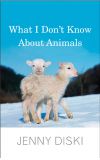
25 Jul 2012 09:50:18
It is a great pity, when one considers not only the irony that Diski's book is a thoughtful examination of our relationships with animals and their minds, or what we think to be their minds; but also the fact that unless Pudsey turns out to be an unusually rewarding subject with depths hitherto unsuspected, the world would be a better place if people bought Diski's book by the warehouseload instead of the mutt's.
I suppose that on the principle, most lately confirmed by Fifty Shades of Grey, that the lousier a book's prose style is, the better it will sell, Little, Brown's decision makes a cynical kind of sense, for Diski is one of the language's great, if under-appreciated, stylists. When you're turning the pages of the London Review of Books, wondering, like a swimmer facing a dauntingly bracing sea, when would be the best time to jump in, you stop turning when you get to the one with Diski's name at the top. And then settle in, secure in the knowledge that for the next 15 minutes or so you are going to be in the company of someone who writes sentences that make you purr. If I may use animal imagery.
Which I do advisedly. Le style c'est la femme, and her honest, direct and intelligent prose has produced an honest, direct and intelligent look at relations between ourselves and the animal world. We anthropomorphise and sentimentalise animals when it suits us – as with pets, for instance – and blank them when that suits us, as when we make no connection between mince on the supermarket shelf and a cow.
Diski is able to look her own sentimentality (she uses the term "pussy cat" often, with what looks almost like defiance) squarely in the eye, and reluctantly – because it's such an obvious quote – brings in Wittgenstein early on: "If a lion could speak, we would not be able to understand it." Sadly, she does not mention the greatest talking animal character of them all, Saki's "Tobermory", but I was reminded of him when I learned here that researchers whisper among themselves about cats who, when they learn which lever it is a scientist wants them to push, would rather starve than push it again. (You knew this, too.)
Intellectually suspect though it may be to imagine ourselves in the mind of an animal, it's one of those things we do. Diski quotes the whole of Genesis 1 as written by some internet imp in the breezy subliteracies of "lolcat" – "Oh hai. In teh beginnin Ceiling Cat maded da skies An da Urfs," and so on. "Ceiling Cat" for "God" is, I admit, rather good, as is "Basement Cat" for Satan, and I have a nasty feeling I will not be able to think of them in anything other than those terms for some time.
Diski gets properly involved with her animals: she watches lambing, she watches elephants, she tries to learn horseriding, despite being a panicky rider who gets vertigo even on a horse, and seeks to conquer her arachnophobia by going to a course held at London Zoo. I remember when this chapter came out in the LRB and it reads even better now: her ability to think squarely and deeply about things means that she can also be very funny indeed. So scared was she of spiders, she felt that the strength of her phobia was actually creating the spiders she saw: "I was working towards a grand theory that maybe God, before the creation, was possessed of a neurotic fear of people and that was how we came about." Her writing is so vivid that when describing something even mildly traumatic I found myself literally tensing up. Screw Pudsey (she touches on bestiality, too, by the way). Read this.

